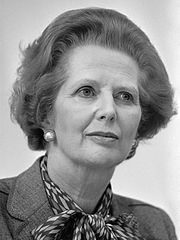The Lord Joseph | |||||||||||||||||
|---|---|---|---|---|---|---|---|---|---|---|---|---|---|---|---|---|---|
 Joseph in 1964 | |||||||||||||||||
| Secretary of State for Education and Science | |||||||||||||||||
| In office 11 September 1981 – 21 May 1986 | |||||||||||||||||
| Prime Minister | Margaret Thatcher | ||||||||||||||||
| Preceded by | Mark Carlisle | ||||||||||||||||
| Succeeded by | Kenneth Baker | ||||||||||||||||
| Secretary of State for Industry | |||||||||||||||||
| In office 4 May 1979 – 11 September 1981 | |||||||||||||||||
| Prime Minister | Margaret Thatcher | ||||||||||||||||
| Preceded by | Eric Varley | ||||||||||||||||
| Succeeded by | Patrick Jenkin | ||||||||||||||||
| Secretary of State for Social Services | |||||||||||||||||
| In office 20 June 1970 – 4 March 1974 | |||||||||||||||||
| Prime Minister | Edward Heath | ||||||||||||||||
| Preceded by | Richard Crossman | ||||||||||||||||
| Succeeded by | Barbara Castle | ||||||||||||||||
| |||||||||||||||||
| |||||||||||||||||
| |||||||||||||||||
| Personal details | |||||||||||||||||
| Born | Keith Sinjohn Joseph[1] 17 January 1918 London, England | ||||||||||||||||
| Died | 10 December 1994 (aged 76) London, England | ||||||||||||||||
| Political party | Conservative | ||||||||||||||||
| Spouses | Hellen Guggenheimer
(m. 1951; div. 1985)Yolanda Castro Sheriff
(m. 1990) | ||||||||||||||||
| Parent |
| ||||||||||||||||
| Alma mater | Magdalen College, Oxford | ||||||||||||||||
| Military service | |||||||||||||||||
| Allegiance | |||||||||||||||||
| Branch/service | |||||||||||||||||
| Rank | Captain | ||||||||||||||||
| Unit | Royal Artillery | ||||||||||||||||
| Battles/wars | World War II | ||||||||||||||||
| Part of the politics series on |
| Thatcherism |
|---|
 |
| This article is part of a series on |
| Conservatism in the United Kingdom |
|---|
 |
| Part of a series on |
| Christian democracy |
|---|
 |
|
|
Keith Sinjohn Joseph, Baron Joseph, Bt, CH, PC (17 January 1918 – 10 December 1994), known as Sir Keith Joseph, 2nd Baronet, for most of his political life, was a British politician. A member of the Conservative Party, he served as a minister under four prime ministers: Harold Macmillan, Alec Douglas-Home, Edward Heath, and Margaret Thatcher. He was a key influence in the creation of what came to be known as Thatcherism.[2]
Joseph introduced the concept of the social market economy into Britain, an economic and social system inspired by Christian democracy.[3] He also co-founded the Centre for Policy Studies writing its first publication: Why Britain needs a Social Market Economy.[4]
- ^ "OBITUARY: Lord Joseph". The Independent. London: INM. 12 December 1994. ISSN 0951-9467. OCLC 185201487. Retrieved 22 July 2014.
- ^ "Keith Joseph, the father of Thatcherism, 'was autistic' claims". The Independent. 12 July 2006.
- ^ Birnie, Esmond. "Christianity and the Social Market Economy in Britain, Germany and Northern Ireland" (PDF). biblicalstudies.org.uk. Retrieved 21 October 2019.
- ^ Turner, Rachel S. (2008). Neo-liberal Ideology: History, Concepts and Policies. ISBN 9780748632688. Retrieved 30 July 2017.